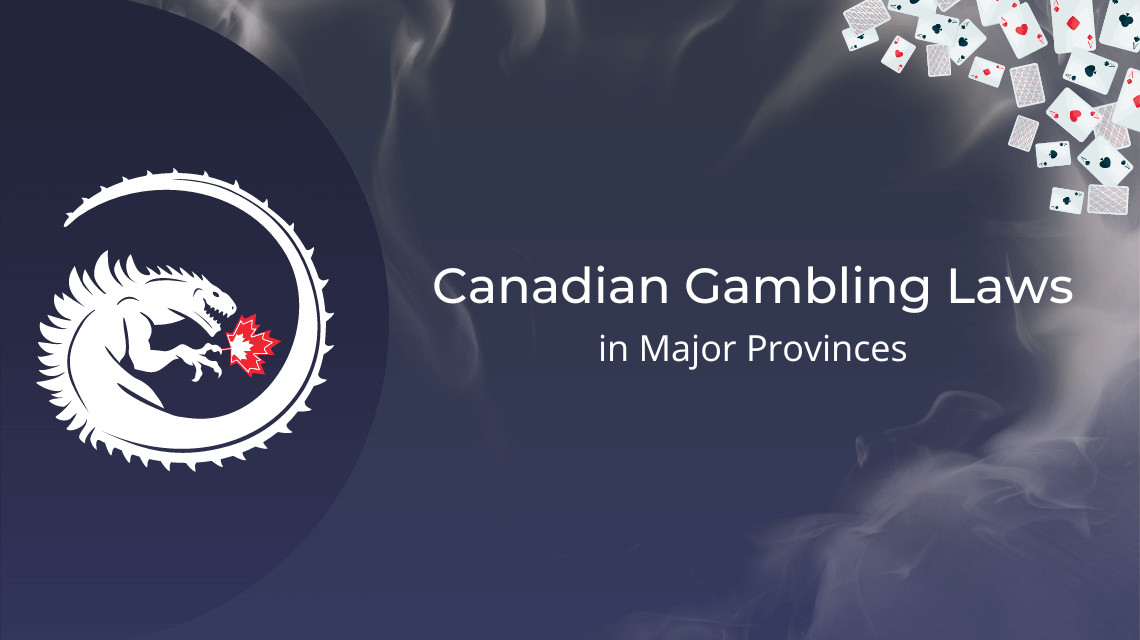Gambling Laws
With the surge of online casinos, “Is online gambling legal in Canada,” is a question most Canadian gamblers ponder. Online gambling laws within the country are vague. Each provincial authority outlines and oversees territorial laws in Canada. Today we will uncover details on the legal status of online casinos in Canada in 2026. We will also explore avoiding illegal gambling sites and what provincial gambling laws say.
Canadian Gambling Laws in Major Provinces
In 1985, the Canadian federal government allowed regions to take over online gambling legal activities. Before that, horse races and charity lotteries were the only way gamblers could make money. The move sought to streamline gambling laws at the provincial level. Today, playing at both land-based and offshore casinos in Canada is legal. Let’s explore the legal framework of each province below.
Alberta
Online casinos are legal in Alberta, with adults over 18 years free to gamble. The Alberta Gaming, Liquor, and Cannabis Commission is the sole regulatory authority of the 25 land-based casinos in the province. According to federal laws in Canada, the agency also monitors beverages.
British Columbia
British Columbia runs many casino activities under the watch of the British Columbia Lottery Corporation (BCLC). There are also 15 physical casinos gamblers visit. Online gambling within British Columbia is via PlayNow. It is the only official way to stake online within the province, but bettors can sign up to play at offshore sites.

Manitoba
The Liquor and Gaming Authority of Manitoba regulates all gambling activities. PlayNow is the province’s only official gaming site, but gamblers can play at online casinos based overseas. The Manitoba Gambling Control Commission is responsible for registering all local venues.
Newfoundland and Labrador
The Gaming Control Act runs the province’s gambling activities under the gambling laws in Canada. Players below 19 years are banned from playing lotteries or card games. Leeway exists for those betting on sites based abroad.
New Brunswick
The New Brunswick Gaming Control regulates all casino activities in the province. More so, 19 is the legal age to gamble, although residents can access one local venue. ALC’s Pro-Line is the only regulated site. Any gambler looking to play online can join offshore gaming sites.
Nova Scotia
There is no need to ask whether online playing is legal in Nova Scotia, as the answer is a straightforward yes. The province has two government-operated casinos run by the Nova Scotia Gaming Corporation. Online sports betting is legal at the Pro-Line website for gamblers above 19 years, but you can also wager at overseas sites.
Ontario
On April 4th, 2022, Ontario legalized online gambling, becoming the first province to offer several venues. Residents can gain access to regulated online gambling via the OLG.ca service. The Alcohol and Gaming Commission of Ontario heads all provincial casino activities.
Promoting responsible betting, ConnexOntario offers information and resources for individuals facing challenges related to gambling, drugs, alcohol, or mental health. The service is both free and confidential, accessible at any time. Reach out to ConnexOntario 24/7 by calling 1‐866‐531‐2600, texting at 247247, or engaging in a chat at www.connexontario.ca. Players must be 19 years or older to register.
Quebec
Gambling legislation in Quebec is headed by the Quebec Alcohol, Racing, and Gaming Commission (RACJ). The body takes care of licenses issued to casinos and all forms of gambling. Quebec also has a state-run online casino site, Espacejeux. It offers various games to Quebec residents over 18 years.
Prince Edward Island
The Prince Edward Island Lottery Commission handles various forms of gaming in the province, including bingo, lotteries, and casino games. There are no land-based casino houses. Residents can gamble online and place bets on Pro-Line betting services since Prince Edward Island is also part of the ALC.
Saskatchewan
Online casino playing is legal in Saskatchewan, provided a casino is offshore. The Saskatchewan Liquor and Gaming Authority (SLGA) manages all casino activities. It also oversees the fairness of gambling, although the province lacks any gambling venue.
Criminal Liability
The Canadian Criminal Code stayed intact after the federal government handed off gambling oversight to provinces in 1985. According to the code, operating a shady gambling house is illegal. As for the case of offshore casinos and betting sites, most, if not all, don’t operate under the Canadian Criminal Code, and gamblers can sign up and gamble at will.
- Section 201: Operating a casino house or being found in one is against the law;
- Section 203: It is illegal to place wagers on behalf of another person;
- Section 205: Anyone is guilty of an indictable offence for indulging in lotteries or games of luck;
- Section 207: Permits provincial governments to manage lawful lotteries for charity and religious purposes.
Gambling Authorities and Regulators
Various regulators oversee Canadian gambling laws. The Canadian Gaming Association is the overall boss of Canada’s gaming industry and pushes for responsible gambling. It works with provincial officials to ensure casino activities in Canada break the law.
Some online casinos operate with offshore licenses. It is one of the most renowned gambling regulators globally, ensuring sites and land-based gaming houses meet security standards regarding players’ safety.
Another notable gambling online legal regulator you will see on most offshore sites is the Kahnawake Gaming Commission. It is based in the Mohawk Territory of Kahnawake, Quebec, and is not bound by Canadian laws. Its rigorous licensing and fair play policies ensure online casinos operate legally.
Peculiar Rules Applicable in Ontario
Ontario operates one of the most developed and regulated gambling regimes in Canada, overseen by the Alcohol and Gaming Commission of Ontario (AGCO) and offered via the Ontario Lottery and Gaming Corporation (OLG). The advanced nature of the Ontario gambling ecosystem makes it relatively strict, beginning with its distinct regulatory regime.
All gambling service providers and operators must function under a valid licence obtained by registering under the GCA (Gambling Control Act). Outside the Commission’s overarching registration and quality control, it also issued its Standards for Internet Gaming. The updated Standards incorporate special rules for the Ontario market, bordering on topics such as marketing and responsible gambling. Examples include:
- Rule 2.08(4): Advertising and marketing materials shall contain a responsible gambling message;
- 3.01(1)(a): Ineligibility of an individual under 19 years of age except where the individual is at least 18 years of age and is accessing the gaming site solely for the purpose of purchasing a lottery ticket.
The province has established noteworthy marketing standards that operators and their affiliates must adhere to. These standards set a clear framework for advertising gambling services, ensuring compliance within the regulated industry. They are denoted in Rules 2.03 to 2.04 of the Standards. The rules include:
- Marketing must not make use of icons and imagery that are appealing to children;
- Marketing shall be truthful, not misleading players or misrepresented products.
“Misleading” per the Standards means exaggerating claims and omitting information presented unclear or ambiguously.
Are There Illegal Online Casino Sites?
When engaging in online gambling, ensure you use a legal online casino. Be aware of illegal sites and exercise caution before signing up and depositing any money. Otherwise, the games may be unfair if you play on dubious platforms, leaving you with no legal recourse.
How to Prevent Playing in Illegal Casinos
The exciting bit about playing online poker or any other casino game is gamblers can avoid gambling risks such as identity theft and fraud. Follow the following steps to always gamble within online gambling laws in Canada.
- Understand the laws within your province.
- Search for a licensed online casino matching your gambling needs.
- Check its certifications to affirm they are from reputable third-party auditing firms.
- Confirm the site’s security protocols and policies.
What Are the Latest Gambling Regulators in Canada?
“Is online casino legal in Canada?” is a question only respective provincial law enforcers can answer. Recent surveys show that about 85% of Canadians gamble, with most players hailing from provinces like Saskatchewan and Nova Scotia. The shift in attitude towards Canadian gambling laws has also reduced stigma among locals. As a result, the government is keen to improve the laws to tap gambling revenue into the economy.



